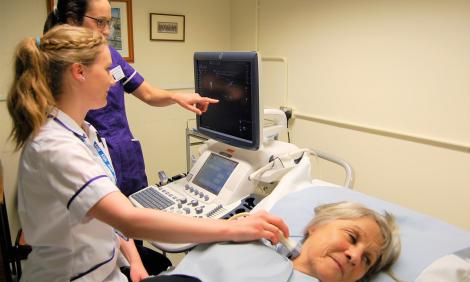Vascular science
Vascular science relates to how blood flows in the body.
If you work in vascular science, you’ll use ultrasound and other non-invasive techniques to image and assess the blood flow of patients with diseases of the arteries and veins.
Working life
Ultrasound and other non-invasive techniques are often the only investigation carried out before a surgical intervention, making this a role with much responsibility.
It's likely that you’ll be based in a hospital or clinic, although some preventative work and screening takes place in GP surgeries. Investigations are usually carried out in dedicated departments but also on wards, in theatre and intensive care.
You’ll work with both in-patients and outpatients, particularly the elderly, and those with disabilities and serious illnesses.
You’ll investigate patients to assist in the diagnosis of disorders, including:
- transient ischaemic attack (TIA)
- stroke
- aneurysm
- peripheral arterial disease
- deep vein thrombosis
- varicose veins
Most vascular investigations are carried out using ultrasound machines. These transmit high-frequency sounds waves into a patient's body for interpretation.
In addition, you will use other equipment to measure circulation in the brain, limbs and vital organs.
You’ll also need to:
- prepare patients for examination
- explain procedures
- review the patient's medical records
- interpret results and write reports
Who will I work with?
You’ll be part of a team which includes, specialist nurses, radiologists, medical consultants and vascular surgeons.
Want to learn more?
-
Most jobs in the NHS are covered by the Agenda for Change (AfC) pay scales. This pay system covers all staff except doctors, dentists and the most senior managers.
Trainee clinical scientists train at band 6 level, and qualified clinical scientists are generally appointed at band 7. With experience and further qualifications, including Higher Specialist Scientist Training, you could apply for posts up to band 9.
Staff will usually work a standard 37.5 hours per week. They may work a shift pattern.
Terms and conditions of service can vary for employers outside the NHS.
-
With further training or experience or both, you may be able to develop your career further and apply for vacancies in areas such as further specialisation, management or teaching.
Healthcare science staff often work at the forefront of research and innovation, so that patients are continually receiving the very best healthcare. For example, in vascular science, you’d be involved in the further development of non-invasive procedures to assess blood flow, and in the development of advanced wound healing techniques and products.
-
Job market
In November 2018, there were 6,123 clinical scientists registered with the Health and Care Professions Council.
The NHS Scientist Training Programme (STP) and Higher Specialist Scientist Training (HSST) attract many more applicants than there are places and so there is considerable competition for places.
Finding and applying for jobs
When you’re looking for job vacancies, there are a number of sources you can use, depending on the type of work you’re seeking.
Check vacancies carefully to be sure you can meet the requirements of the person specification before applying and to find out what the application process is. You may need to apply online or send a CV for example.
For the STP and HSST there is an annual recruitment cycle and applications should be made through the National School of Healthcare Science's website, where you can also find information about the programmes and the recruitment process.
Key sources relevant to vacancies in the health sector:
- vacancies in organisations delivering NHS healthcare can be found on the NHS Jobs website
- opportunities in the Civil Service can be found on the Civil Service Jobs website
- vacancies in local government can be found on the Local Government Jobs website and the Jobs Go Public website
As well as these sources, you may find suitable vacancies in the health sector by contacting local employers directly, searching in local newspapers and by using the Universal Jobmatch tool.
Find out more about applications and interviews.
Volunteering is an excellent way of gaining experience (especially if you don’t have enough for a specific paid job you’re interested in) and of seeing whether you’re suited to a particular type of work. It’s also a great way to boost your confidence and you can give something back to the community.
-
For further information about a career in vascular science, please contact:





